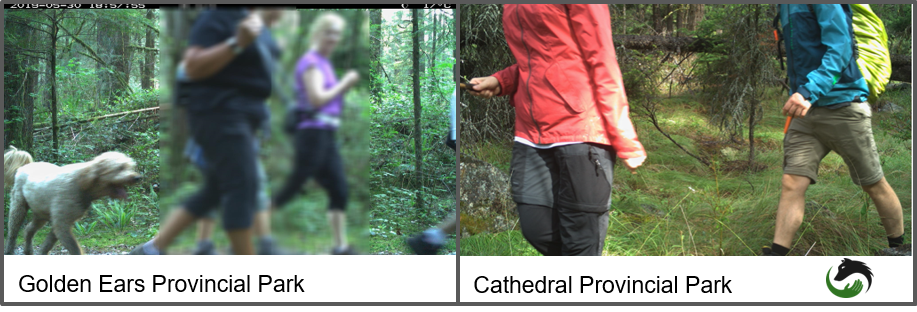Ecologists are increasingly studying the consequences of outdoor recreation on wildlife providing a glimpse into how this type of human activity might affect various species. Several recent studies (e.g. Naidoo & Burton 2020; Kays et al 2017) have improved our understanding of how animals might respond to recreation in parks and other protected areas. However, relative to other human activities, our current knowledge of how recreation affects wildlife is limited. We are just beginning to identify some of the major knowledge gaps in recreation ecology and priorities for research in western Canada related to this topic.

In an effort to bring together people working on projects related to recreation ecology, Dr. Pamela Wright (University of Northern British Columbia) and Aerin Jacob (Yellowstone to Yukon) co-organized a day-long virtual recreation ecology workshop last month, which Dr. Cole Burton and I were invited to attend. This event included participants from academia, government (e.g. BC FLNRORD, BC Parks, Parks Canada, Alberta Parks, Government of Yukon), outdoor recreation groups, and NGOs. The workshop allowed us to exchange information about research underway in BC, AB, and the Yukon.
Dr. Burton and I had the chance to present research from the WildCo Lab and WildCAM and over the course of the day we also heard about important work by Drs. Karine Pigeon (UNBC & Y2Y), John Paczowski (Alberta Environment & Parks), Tom Jung (Government of Yukon) & Jasmin Majchraz (University of Alberta & Yukon University), Courtney Hughes (Alberta Environment & Parks) and Kim Dawe (Quest University) who are all working to better understand how recreation affects various species in the region. Managing recreation in parks also involves understanding human behaviour and we heard about research on human dimensions and management of human impacts in parks from Maureen Naudeau (Simon Fraser University), and Farhad Moghimehfar (Vancouver Island University).
We were lucky that several members of government and from the outdoor recreation industry attended. During the afternoon panel discussion, we had the chance to hear about government priorities for protected areas and recreation and challenges faced. It was extremely insightful and useful for researchers to hear from this group as it allowed us to better understand the needs of managers on the ground.
We are thankful to Dr. Wright, UNBC, and Y2Y for organizing this workshop and at its conclusion, we felt optimistic about the connections made and possibilities for future collaboration. The group agreed to meet again later this year and, we are looking forward to future involvement and discussions about recreation ecology in western Canada.
.
Author: Alys Granados, WildCo Postdoc and WildCAM Science Coordinator